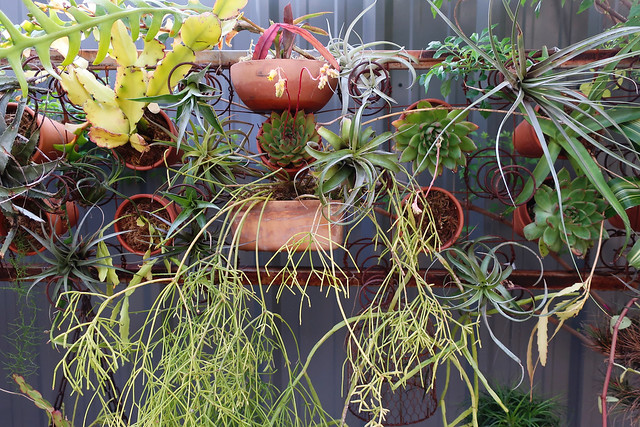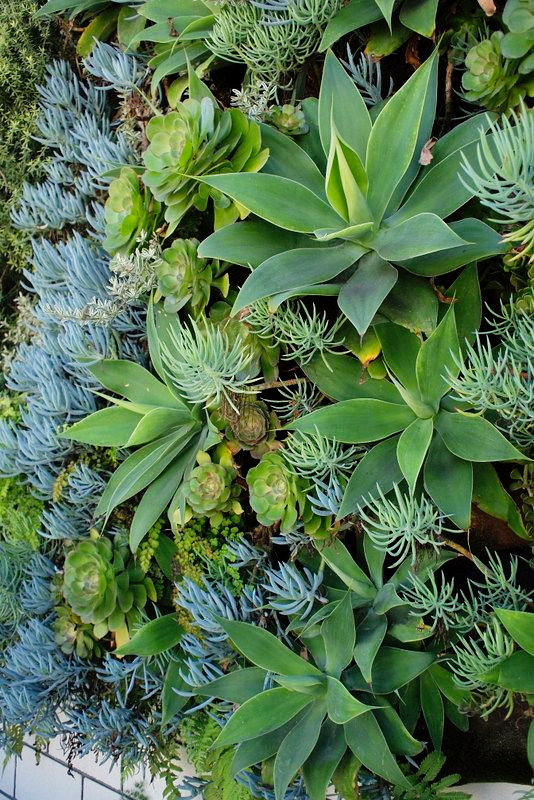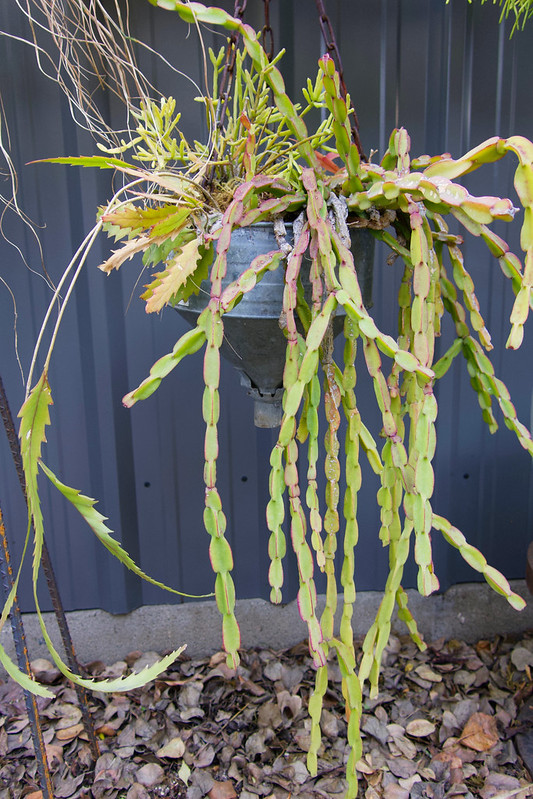My latest time sink and a great antidote to the pandemic fidgets. It’s a little rough and a lot rustic, part of the perpetual quest to get plants massed in one area for ease of care, especially now that warm weather isn’t far off (in the 80s today!) Along with practical considerations, which include in some cases getting pots out from underfoot, there are aesthetic ones as well to elevating plants for heightened scrutiny — looking down at plants from a height of roughly 5’8″ is an entirely different experience from having them at eye level just a few inches away.
My current effort is not a living wall exactly, because I chose to keep things lightweight and potted. The armature is visible rather than a sheet of solid greenery. One approach that I’ve tried in the past included kokedama-like mossy confections that basically require a permanent mister to survive outdoors in zone 10 (both sarcastic and true); and as this was a pandemic project, pots seemed the best option since I have lots of spares. And with clay pots, I can mist the pot itself and it will absorb moisture even if staged horizontally — enough moisture to keep rhipsalis and bromeliads happy. That’s the theory anyway.
As a pandemic project, my unwritten rules are to use what’s at hand, without leaving the house, like the rusty mattress wired into a 2X7′ metal frame my neighbor gave me a few months ago, held up on rebar tripods. (If I hadn’t given that same neighbor a roll of cattle panel, I would have used that instead.) So a pandemic project is similar to pandemic cooking, using only what’s in the cupboard (which in our case usually involves anchovies).
A lot of zone 10, dry-tolerant odds and ends are being trialed that I feel have loads of potential for a modified green wall such as this since they don’t require heavy amounts of soil and moisture — relatively lightweight stuff like rhipsalis, tillandsias, bromeliads, Puya laxa, the climbing onion Bowiea volubilis, with a couple echeverias thrown in and even an Agave ‘Mateo’ pup. Pots are wedged between the spirals, with the heavier ones wired in for extra strength and support. Most pots are horizontal with a few staged upright. I picked up some Crassula multicava over the weekend, which has a foamy white bloom (aka the Fairy Crassula), another unkillable plant that’s a natural for vertical gardens. Other likely candidates are the False Bromeliad, Callisia fragrans, and Aechmea recurvata, so many of the smaller bromeliads like ‘Benrathii’…
With the sheltering cypress gone, this funnel of rhipsalis and other potted rhipsalis were overnight exposed to drying winds, and I could tell the epiphytic cacti were struggling in the changed conditions. With the funnel moved to hang from the base of the frame, the resurgent health of this rhipsalis has been dramatic.
A rebar tripod was already in place at one end to support the tecomaria along the fence that’s over 12-feet high now, so a rebar tripod was added to the other end as well to support the frame. The tecomaria’s lower branches thread along the back of the frame, an effect I’d like to develop if the structure stays in place.
On the plus side, so many plants on hand were absorbed into the project, and this eastern exposure is ideal for them, sunny but protected from wind. The metal fence won’t mind the frequent misting for the tillandsias. And I love the narrow profile and the fact it fits into an awkward, unused area. The plants in the pots that are fully horizontal may prefer to be tipped up slightly at an angle to retain moisture, and of course bromeliads like their cups filled with water, so I may rework things a bit. And reworked or not, I’m still uncertain if I really love the result (or more importantly, if the plants will love it), and if shelving wouldn’t be preferable after all. So it may just get filed under “useful projects to kill time in a pandemic” and then torn apart when I’m not under the influence of the pandemic anymore. Which time is now surely coming, right? Lots of us in my family are partially vaccinated, and herd immunity seems more and more achievable.
For a look at what the living wall pros are up to, check out Austin-based Articulture for inspiration.
Hope you’re staying healthy and…um…keeping busy….










I love this, Denise. You made great creative use of the materials you had on hand (not that I know many people who have a rusty mattress frame to work with). I hope regular misting does the job with the pots placed on their sides – that would be my biggest concern but then I’m terrible about keeping small hanging pots watered even when they’re upright. The Puya is particularly striking in this setting.
This is gorgeous and very clever. Ironic when forced to how inventive we become. Especially admiring of your rhipsalis. I have three but I don’t think they have grown in the 2 years I’ve had them.
WOW! This is fantastic, well done! I would have loved a photo stepped back a few paces, so I could see the entire thing, but what you’ve shared looks very well done and in keeping with your overall garden style. I am a little jealous that you can create something like this and leave it up, year round. The tear-down for winter aspect of anything I’d make is sometimes demoralizing.
@Kris, I reworked the horizontal pots this morning, wiring them in more upright so they can hold a little more moisture. I can’t believe how warm it’s getting already! Yeah, funny how I happen to have a rusty mattress hanging around…
@Elaine, the rhipsalis do pretty well for me. I’ve seen local ones a lot bigger, so the grass is always greener…the rhipsalis always bushier…
@Loree, I’ll get more photos up — it’s already so changed! I moved in underneath some of the large potted tropicals, tucked in bromeliads, etc., you know how that goes…
It looks good, but plant health over time will be the deciding factor, eh? Especially in summer heat. Looks like it will be easy to spritz everything with the hose, runoff watering the pots below.
What a great solution to Empty Fence Syndrome. My fences need more perma-structure aka less herbaceous stuff and more life in winter. My pandemic projects have been decidedly on the demolition side.
Yay for more photos! Thank you.